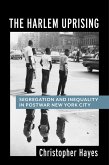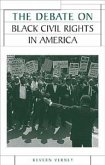This book was originally published in 1943 with the title "New World A-Coming: Inside Black America." Roi Ottley won the Anisfield-Wolf Book Award for Non-Fiction in 1944 for "New World A-Coming: Inside Black America."
An Excerpt from the review of the book in the New York Times, August 10, 1943 From Books of the Times by John Chamberlain THIS is a war for democracy," says the anti-Hitler white American. "Brother," said the Negro, "I'm going to hold you to that." The Negro's tone is polite. But it is firm. Both the firmness and the politeness are in Roi Ottley's "New "World A-Coming: Inside Black America," which started out to be a book about Harlem and ended up by becoming a book about the Negro's position in wartime America. Mr. Ottley, who spent seven years covering Harlem as a reporter, editor and columnist for The Amsterdam Star News, knows both his home locale and the wider implications of his subject. He writes a vigorous prose, mingling history, humor, irony, drama and sober reflection in a work that explains the current status and the wholly reasonable demands of the Negro as no other book does. In 1900 Harlem was a cheerful neighborhood of broad drives, brownstone fronts and quiet, almost suburban aloofness. Its small Negro population consisted of the black aristocracy, including Bert Williams, the actor, and Harry T. Burleigh, the composer. As the little Negro community expanded, racial warfare broke out, a war that the white real estate men were winning up to the time when the Pennsylvania Railroad, seeking a site for a new central terminal, paid $510,000 in cash for a Negro church in the Thirty-third Street district With this money Negroes bought thirteen large apartment houses on 135th Street near Lenox Avenue, and the modern history of Harlem had begun. Mr. Ottley traces that history in all its tumultuous ramifications. Harlem is colored. But color in Harlem is infinitely subdivided, with African, Mongolian, European, Indian and Latin-American mixtures making the place an anthropologist's despair-or paradise. Since the purchase of the thirteen apartment houses on 135th Street black Harlem has become a by-word for overcrowding. In the Twenties Harlem had its brief springtime. "Keed" Chocolate, Tiger Flowers and Battling Siki paraded its streets; Marcus Garvey preached his back-to-Africa doctrine and sold stock in his Black Star steamship line, which ultimately failed for thousands of dollars. The Negro renaissance was under way, with Paul Robeson, Roland Hayes and Charles Gilpin becoming big-time names. But the Twenties faded swiftly into the depression years-the era of Father Divine and his comforting Heavens, and of Joe Louis who did more than anyone else to save the self-respect of a race. ... With his chapter on Joe Louis Roi Ottley moves out of Harlem into the broad currents of Negro life in America. He writes vividly of the newest Negro leaders-Adam Clayton Powell, the crusading preacher; A. Philip Randolph, president of the Brotherhood of Sleeping Car Porters; Mrs. Mary McLeod Bethune, president of the National Council of Negro Women; Paul Robeson and Marian Anderson, who refuse to sing for segregated audiences; Ted Poston, racial adviser to-Elmer Davis; Dr. Robert C. Weaver, the first Negro ever to earn a Ph. D. in economics from Harvard University, and Chrystal Bird Fauset, adviser to Dean Landis, head of the Office of Civilian Defense. Added to the names of older Negro leaders such as Walter White, these make an imposing list.
An Excerpt from the review of the book in the New York Times, August 10, 1943 From Books of the Times by John Chamberlain THIS is a war for democracy," says the anti-Hitler white American. "Brother," said the Negro, "I'm going to hold you to that." The Negro's tone is polite. But it is firm. Both the firmness and the politeness are in Roi Ottley's "New "World A-Coming: Inside Black America," which started out to be a book about Harlem and ended up by becoming a book about the Negro's position in wartime America. Mr. Ottley, who spent seven years covering Harlem as a reporter, editor and columnist for The Amsterdam Star News, knows both his home locale and the wider implications of his subject. He writes a vigorous prose, mingling history, humor, irony, drama and sober reflection in a work that explains the current status and the wholly reasonable demands of the Negro as no other book does. In 1900 Harlem was a cheerful neighborhood of broad drives, brownstone fronts and quiet, almost suburban aloofness. Its small Negro population consisted of the black aristocracy, including Bert Williams, the actor, and Harry T. Burleigh, the composer. As the little Negro community expanded, racial warfare broke out, a war that the white real estate men were winning up to the time when the Pennsylvania Railroad, seeking a site for a new central terminal, paid $510,000 in cash for a Negro church in the Thirty-third Street district With this money Negroes bought thirteen large apartment houses on 135th Street near Lenox Avenue, and the modern history of Harlem had begun. Mr. Ottley traces that history in all its tumultuous ramifications. Harlem is colored. But color in Harlem is infinitely subdivided, with African, Mongolian, European, Indian and Latin-American mixtures making the place an anthropologist's despair-or paradise. Since the purchase of the thirteen apartment houses on 135th Street black Harlem has become a by-word for overcrowding. In the Twenties Harlem had its brief springtime. "Keed" Chocolate, Tiger Flowers and Battling Siki paraded its streets; Marcus Garvey preached his back-to-Africa doctrine and sold stock in his Black Star steamship line, which ultimately failed for thousands of dollars. The Negro renaissance was under way, with Paul Robeson, Roland Hayes and Charles Gilpin becoming big-time names. But the Twenties faded swiftly into the depression years-the era of Father Divine and his comforting Heavens, and of Joe Louis who did more than anyone else to save the self-respect of a race. ... With his chapter on Joe Louis Roi Ottley moves out of Harlem into the broad currents of Negro life in America. He writes vividly of the newest Negro leaders-Adam Clayton Powell, the crusading preacher; A. Philip Randolph, president of the Brotherhood of Sleeping Car Porters; Mrs. Mary McLeod Bethune, president of the National Council of Negro Women; Paul Robeson and Marian Anderson, who refuse to sing for segregated audiences; Ted Poston, racial adviser to-Elmer Davis; Dr. Robert C. Weaver, the first Negro ever to earn a Ph. D. in economics from Harvard University, and Chrystal Bird Fauset, adviser to Dean Landis, head of the Office of Civilian Defense. Added to the names of older Negro leaders such as Walter White, these make an imposing list.
Dieser Download kann aus rechtlichen Gründen nur mit Rechnungsadresse in A, D ausgeliefert werden.









